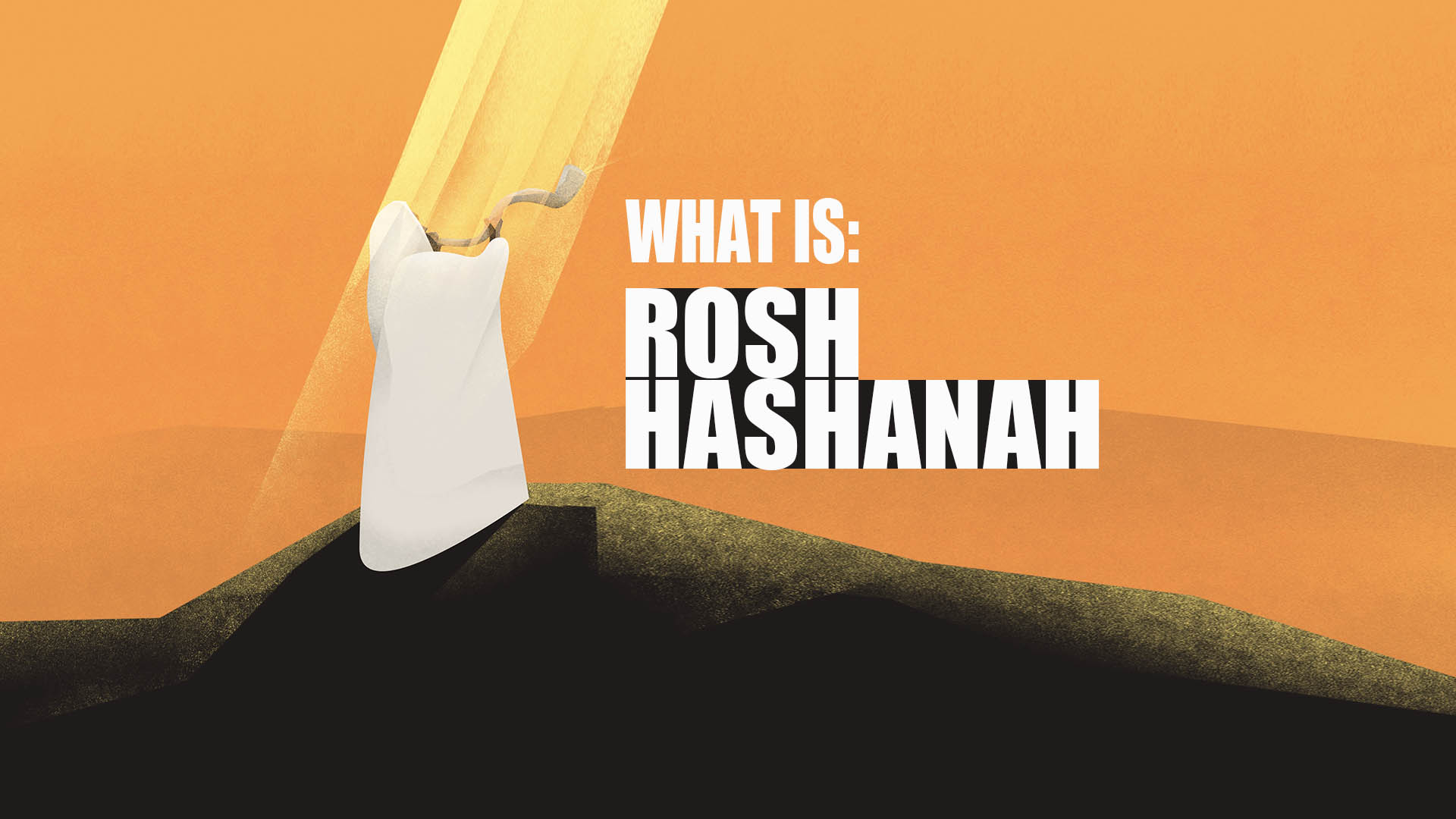What is Rosh Hashanah?
A “new year” celebration, Rosh Hashanah invites us into a new creation. A clean slate, a fresh start, a do-over from anything in our lives that we feel is wasted or unworthy.


What is Rosh Hashanah?
A “new year” celebration, Rosh Hashanah invites us into a new creation. A clean slate, a fresh start, a do-over from anything in our lives that we feel is wasted or unworthy.
One of the unfortunate (and ironic) realities is that so many precious believers who cherish the Scriptures—from Genesis through Revelation—have missed out on a glorious detail sitting right on the page:
And the Lord spoke to Moses, saying, “Speak to the children of Israel, and say to them: ‘The feasts of the Lord, which you shall proclaim to be holy convocations, these are My feasts. – Leviticus 23:1-2 (NKJV emphasis added)
While many of us have heard the term “Jewish holidays” and not given it a second thought, the biblical text stands in defiant protest. Rather than considering these annual celebrations and observances relegated to an ethnic group, the Bible plainly states that they belong to our God. Or said another way, the Bible plainly states that God identifies them as His. Wow!
Now before we proceed, it must be established from the outset: we are saved by grace through faith, and it is “not based on deeds, so that no one may boast” (Ephesians 2:9). This means that one’s covenantal standing with God as justified and sanctified is not dependent on observance of the Lord’s festivals (in Hebrew, moadim or “appointed times”).
The Feasts of the Lord do not represent an obligation. They are an opportunity for believers of all ethnicities to journey deeper in their faith. They aren’t an imposition but an invitation. Welcome!
Two concepts need establishing: alphabets and calendars. While Americans will immediately think of “A-Z” and “January-December,” the Hebraic reality is different. The Hebrew alphabet is alpha-numeric, meaning that its letters have distinct numerical values so the letters are used to write numbers. The Hebrew calendar is “lunisolar,” features “leap months,” and has several new years. Rather than using the life of Yeshua as a basis for determining years, the Hebrew calendar is based on the tradition’s understanding of Creation (yes, as in, Adam and Eve!). With these details in mind, let’s jump into a discussion of one of those Jewish new year markers, Rosh Hashanah.
Hebrew for “head of the year,” Rosh Hashanah is observed on the first day of the month of Tishrei, which typically falls during September on our calendars. We find the biblical basis for Rosh Hashanah (also known as the “Feast of Trumpets”) in Leviticus 23:23-25,
Then the Lord spoke to Moses, saying, “Speak to the children of Israel, saying: ‘In the seventh month, on the first day of the month, you shall have a sabbath-rest, a memorial of blowing of trumpets, a holy convocation. You shall do no customary work on it; and you shall offer an offering made by fire to the Lord.’”
As stated above, the biblical calendar is oriented to the original week of creation, and Rosh Hashanah is a celebration of it. In theory, the “Christian” calendar marks 2022 years since Yeshua’s birth. Similarly, the Jewish calendar recognizes 5782 years since the creation account in Genesis.
As a “new year” celebration, Rosh Hashanah invites us into a new creation—a clean slate, a fresh start, a do-over from anything in our lives that we feel is wasted or unworthy. I believe there is a powerful, prophetic connection between a given year’s number and what sorts of (new) things God wants to do in our lives. More on that later.
The title “Feast of Trumpets” connects to the command to sound trumpets during Rosh Hashanah. The blast of a ram’s horn (known as a shofar) was especially meaningful in ancient Israel. From warfare to celebrations and the coronation of Israel’s kings, the shofar remains integral to Jewish ceremonial and liturgical life. And since Rosh Hashanah begins the “Ten Days of Awe,” culminating in Yom Kippur (the Day of Atonement), the shofar blasts during Rosh Hashanah are a “spiritual alarm clock.” It’s easy to be lulled into a spiritual sleep, distracted by good things rather than living passionately for God-purposes. Now we hear those words screamed at Jonah: “What, are you sleeping? Get up! Call out to your god” (Jonah 1:6).
While it is true that reflection and repentance are primary aspects of this awakening, there’s another dimension to this special day. It’s the head of the year. A fresh start. New creation. God is active in our time and history. He created each one of us with purpose and calling. And so, I think we must listen closely to the Spirit as we annually approach Rosh Hashanah. What might the Lord want to do in the upcoming year? In the upcoming decade? One of the ways we discern this is by studying the connections between letters and numbers associated with the year and the decade.
I don’t if you’re aware of this, but we’ve been living in the ‘80s. No, not the era of Ronald Reagan, Miami Vice, and parachute pants—the 5780s. As of this writing, the year 5782 is nearing its conclusion. Both the numbers “80” and “782” have significance in relation to the Hebrew language because, as noted earlier, it’s an alpha-numeric language. Hence, in Hebrew one writes “80” using the letter “peh.” Peh is not only a letter, it’s the Hebrew word for “mouth.” So, the ‘80s (on the biblical calendar) is the “Decade of the Mouth.” I’ve done a great deal of teaching on this topic, but I’ll simply say here that there is a unique anointing available in this season for God’s people to open their mouths wide and proclaim His promises in faith and trust!
And “782” is significant too. In the original Hebrew, the letters in the phrase “And I will give you Shalom” (Numbers 6:26) = 782. Incredible! You may know that shalom is Hebrew for “peace.” But I have good news for you: shalom means so much more than the mere absence of conflict.
Shalom is the fusion of physical and spiritual well-being and blessing. Shalom means to be whole. With this in mind, consider Yeshua’s words to His disciples, “Shalom I leave you, My shalom I give to you; but not as the world gives! Do not let your heart be troubled or afraid” (John 14:27).
Consequently, I believe that this has been a year (5782) when supernatural peace and wholeness has been available to God’s people in unique and particular ways.
September 25th, 2022 brings us to Rosh Hashanah 5783. Don’t miss out.
Hear the trumpet blast. Be alert and attentive. What will the Spirit say to us in this season?
He who has an ear, let him hear what the Ruach is saying to Messiah’s communities.
– Revelation 2:7
"A new perspective for Christians or Gentile believers. Excellent discussions."
What is Fusion with Rabbi Jason?
It is in looking back at what God has done that we can see forward to His future plans for us. “For I know the plans I have for you,’ declares the Lord, plans to prosper you and not to harm you, plans to give you hope and a future” Jer 29:11.
At Fusion Global with Rabbi Jason Sobel, we want to add definition to your faith as we restore the lost connection to our ancient roots and rediscover our forgotten inheritance.

[…] first holiday is Rosh Hashanah, which marks the beginning of a new year (civil) by blowing the shofar (ram’s horn). And blow the […]
[…] forces and breaks their hold on people and objects. These phenomena, they go on to say, are why we sound the shofar on Rosh Hashanah and during the daily prayers of repentance. They say that shofar drives “the Satan” and the “Evil Inclination” away long enough for […]
[…] At first glance, the Jewish custom known as Tashlich may seem somewhat odd. On the first day of Rosh Hashana, one walks to a river, stream, pond, or any other body of water (or substitute a bucket), says some […]